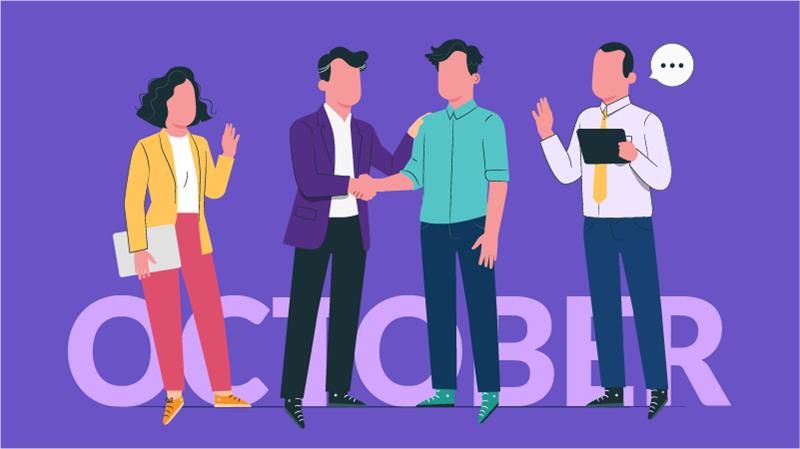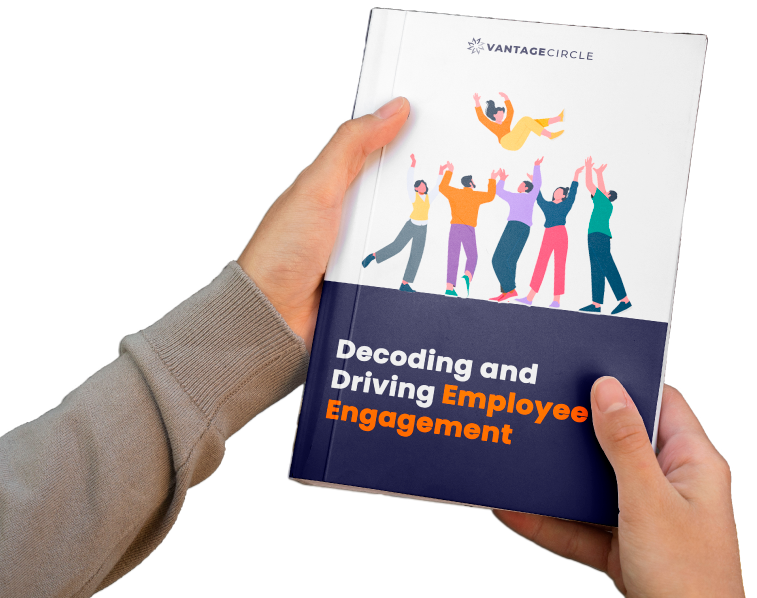Why Employee Loyalty is a Cornerstone of Workplace Success

A Global Employee Recognition and Wellness Platform
Loyal employees in any company create loyal customers, who in turn create happy shareholders
-Richard Branson
Employee loyalty is not something to be taken lightly. Neither is it simply a "nice to have" element in your organization. Yet for many companies, loyalty is becoming harder to earn , and even harder to retain.
With employee turnover on the rise the average tenure of a U.S. worker is less than 4 years!
And here is what that means for you-employees are now starting to leave organizations as soon as their experience and training begin to pay off.
So, how does this affect your organization?
When employees quit too soon, you don't just lose headcount- you lose money, time, culture, and momentum. Knowledge walks out the door, projects slow down, and teams get stuck in the rebuilding loop.
If you want to avoid such situations,I am here to help you. In this blog, I willl explore why employee loyalty is important in the workplace—and share practical ways to build a committed, high-performing workforce that drives lasting success.
Key Takeaways
- The Benefits of Having a Loyal Workforce
- What Drives Employee Loyalty in Today's Workplace?
- The Characteristics of a Loyal Employee
- The Risks of Ignoring Employee Loyalty
- Strategies for building employee loyalty
The Benefits of Having a Loyal Workforce
A loyal workforce can help the company reap benefits in various areas, ultimately taking the company to new heights. Let's break down some of the key advantages of cultivating employee loyalty:
1. Skyrocketing Productivity and Performance

A loyal employee will consider the organization first and how they can contribute towards the goal. They are not here just to clock in.
Gallup has shown that an engaged workforce [ a strong indicator of loyalty] has 18% higher productivity (sales) and 23% higher profitability as compared to those with lower loyalty and engagement.
The reason behind this is simple- loyal employees have a clear mind about what they need to achieve have a clear mind about what they need to achieve and deliver. Thus, resulting in higher productivity and quality performance.
2. Slashing Turnover Costs and Retaining Talent
As an HR professional, you already know how expensive and disruptive employee turnover can be. Every time an employee leaves, the company incurs the cost of recruiting and training a replacement.
In fact, according to one study , replacing a single employee can cost the company up to 2x their annual salary.
And those are direct costs: the loss of a high-performing employee can hurt customer relationships and team morale.
Instead of frequently backfilling positions and incurring high turnover costs, organizations can increase their retention rate by focusing on promoting and promoting internally.
And that’s because a well-appreciated employee, a key driver of loyalty, is 45% less likely to leave their company. Recognition, when done right, doesn’t just boost morale—it directly improves retention.
3. Cultivating a Positive and Collaborative Work Culture

A loyal workforce can help create a healthy company culture by fostering cooperation and trust.
Their commitment keeps the workflow intact which in return increases efficiency. This efficiency in teams reduces conflicts and friction.
When an employee is loyal to the organization, they prioritize team success that aligns with the organization's value. In return, it creates a high value culture that focuses on results.
On the contrary, high turnover environments showcase toxicity where employees find it difficult to thrive.
Hence, it is critical to maintain a culture that is driven to empower employees.
4. Enhancing Customer Satisfaction and Loyalty

They stay longer, collaborate better, take ownership, and consistently deliver higher-quality work, because they’re invested, not just employed.
As a result, customer retention increases. Why is this possible? It is due to the fact that organizations with exceptional customer service know how to train and upskill their employees.
In return, employees understand that their is a significant scope of growth in the workplace. This improves their loyalty in the organization.
Contrary to this, companies with high turnover and disengaged employees are losing clients or providing poor customer service, which often lacks enthusiasm that clients quickly notice.
5. Boosting Innovation and Problem-Solving
Loyal employees have a deep sense of commitment towards their organization. They understand what is expected of them and have a clear picture of all the little things that exist.
This enables them to tackle any issue with greater problem-solving capabilities while thinking critically. They do not miss any opportunity to become creative and resolve issues with an innovative approach.
Having a set of loyal employees brings the ability to take initiative and guide the rest of the team. This instils leadership capabilities within the workplace and enables the workforce to perform better.
6. Strengthening Your Employer Brand and Attracting Top Talent

As an HR professional, you understand that employer branding is key to attracting top talent. And a loyal workforce is your best asset when it comes to building that brand.
Loyal employees naturally become company ambassadors. They share their positive experiences, give glowing company reviews on job boards, and also refer great candidates.
The current generation of job seekers is highly educated and skilled. They research the companies before applying.
In doing so, they gain an inside look at how the company honestly operates, shaped by the voices of current or former employees.
That's why a loyal workforce helps ensure that what candidates hear about your company is positive.
What Drives Employee Loyalty in Today's Workplace?
Employee loyalty doesn't happen accidentally; it's driven. Multiple factors drive it, such as fair pay, manager relationships, flexibility, and culture.
To understand what drives employee loyalty, I have compiled a list of today's top loyalty drivers below:
1. Recognition and Appreciation: Feeling Valued

Human beings have always been social animal. We thrive on recognition and appreciation for the things we do. The workplace is no exception to this. Your employees are more likely to stay loyal if they feel their work is being noticed and valued.
Individuals who receive regular recognition at work are more likely to develop an emotional attachment to their organization.
Recognition need not always be monetary (a simple shoutout during meetings can do wonders), but it should be consistent and genuine.
On the other hand, those who don't receive any form of recognition suffer from frustration. This makes such employees quit their companies over time.
Therefore, to build a loyal workforce, make recognition a part of your culture.
2. Opportunities for Growth and Development
Another strong loyalty driver in the workplace is the opportunity for growth and development.
Your employees will stick around if they see a future with the organization. This could involve offering them new learning opportunities, upskilling, and taking on new challenges.
Companies need to consistently invest in their employees' growth, as the payoff can be substantial. The idea is to improve their career graph and make them future leaders.
For instance, a study by Gallup has confirmed that companies that prioritize employee development are 2 times more likely to retain them and also achieve 11% higher profitability.
3. Supportive Leadership and Management

People leave managers, not companies. Unsupportive management and leadership will cost you your top talent.
Employees are willing to go the extra mile and stay for years with leadership that supports them.
On the other hand, poor management can drive top performers to quit. A study reports that 57% of employees have quit their jobs due to their managers and toxic leadership.
Creating a supportive work environment shouldn't be rocket science. Factors such as transparent communication, regular feedback, and ongoing training will help keep your retention rates high.
4. A Positive and Inclusive Company Culture
"Work culture" may have become a corporate buzzword today, but it's more than that. At its core, it has a significant impact on employee loyalty.
Work culture that are free of micromanagement align more towards empowering the employees. It is value-driven and the focus is more on being inclusive. This enables the employees to develop a connection with each other.
In environments like this, employees feel valued and take pride in their work. A report by SHRM found that only 9% of employees think about quitting in a positive work culture.
Meanwhile, 42% of employees would consider leaving if the culture is toxic and unsupportive.
A great culture knows how to retain its employees. In contrast, a toxic company culture knows how to push its talent away.
5. Competitive Compensation and Benefits

It's not possible to talk about employee loyalty without addressing the basics of salary and benefits.
Fair and competitive pay and benefits are significant ways employees feel valued.
Offering fair pay and benefits demonstrates a company's commitment to its employees.
Fair compensation, often referred to as a "hygiene factor," can help build trust and loyalty. Employers should regularly update their compensation packages to attract and retain top talent.
Additionally, they must revise their benefits package. Such packages should include health insurance, retirement plans, education assistance, and other key benefits.
6. Work-Life Balance and Wellbeing Initiatives

After the Covid-19 pandemic, people have re-evaluated their work priorities.
According to the World Economic Forum, employees now demand better work conditions along with a good paycheck. This shows that a work-life balance is no longer a nice-to-have perk.
Organizations that have adopted this approach, offering flexible schedules, remote work, and mental health assistance, have started seeing positive returns.
Employees are naturally more focused and deeply committed in these companies.
On the other hand, companies that overlook burnout and have overworked employees increase the risks of rapid turnover. Therefore, loyalty now rests on seeing employees as humans, not machines.
The Characteristics of a Loyal Employee
Here's an important question: How do we know if an employee is loyal?
Loyalty cannot be measured solely by an employee's tenure. It is reflected in their work and daily behavior. Here are a few telling signs of a genuinely loyal employee:
1. Proactive Engagement and Initiative
Loyal employees actively take the initiative and seek ways to contribute to their goals and the company's vision.
They proactively take volunteers for projects, share ideas, and resolve conflicts without being asked to.
They operate with an ownership mindset, treating the company's mission and challenges as their own.
This level of engagement stems from a deep commitment to the company's success.
2. Commitment to Company Goals and Values
Loyal workers tend to be well-aligned with the organization's goals.
This alignment is reflected in their daily choices without anyone prompting them. Their decisions stand on the company's core values and principles.
For instance- if customer service is one of the core company values, then they'll go the extra mile to ensure excellent customer service.
3. Willingness to Support Colleagues

Another sign of a loyal employee is being a devoted team player. They actively contribute towards the team's success and ensure it always runs smoothly.
They step up for the team when needed and never say, "That's not my job."
You'll often see them helping a colleague, sharing knowledge, or training a new hire.
They share and give credit when it's due and collaborate when needed. And in tough times, they are there to provide support and courage to their colleague.
Their loyalty not only benefits the team but also inspires those around them.
4. Positive Representation of the Company
You can determine who is a loyal employee by observing how they speak about their organization. Loyal workers are the most consistent champions of their organization.
You will never catch a deeply committed employee criticizing their place of work.
Loyal employees represent their company positively—regardless of the situation or who they’re speaking to, whether it’s customers, clients, or even a candidate’s family.
However, if they do have grievances, they will try to resolve them constructively through proper channels.
5.Resilience During Challenges

Resilience during difficult times is a true mark of loyalty. A loyal employee wouldn't jump ship during company setbacks, such as economic downturns or internal changes.
Instead, they increase their efforts to pull the company out of trouble. Loyal employees operate with a "we're in this together" mindset.
They know when to keep their ambition aside and work through the problem.
Over time, this behavior creates a cycle of loyalty that builds resilience, which in turn deepens loyalty.
The Risks of Ignoring Employee Loyalty
Ignoring loyalty will trigger erosion- of trust, culture, and long-term growth. Here are a few risks of ignoring employee loyalty that you need to prevent:
1. Increased Absenteeism and Disengagement

Disengaged employees are more likely to mentally disengage, call in sick, or show up late. This is called absenteeism, and it is one of the early warning signs of declining loyalty.
According to Forbes a single disengaged employee earning approximately $60,000 to $80,000 per year can cost between $20,400 to $27,200 annually. These numbers should scare you!
The continuous loss of workdays and disrupted workflows create unfair pressure on employees who do show up. And this pressure creates a cycle of resentment and burnout.
2. Higher Error Rates and Lower Quality Work
The bare minimum becomes the standard in companies lacking loyalty and engagement. Instead of pursuing excellence, they settle for being "good enough."
Gradually, this leads to increased negligence, lower service standards, and a failure to meet client needs.
Furthermore, this creates pressure on those who want to put in the work, making them pick up the slack.
Over time, a disengaged workforce can lead to companies losing their clients, reputation, and top talent.
3. Negative Impact on Team Morale and Productivity

Low loyalty means low employee morale. When a couple of employees stop putting in the effort, the others feel it. That is because disengagement is contagious.
According to SHRM, when top performers leave, it erodes the confidence of those who remain. Low collaboration, cynicism, and internal conflicts emerge as morale begins to suffer.
And over time, they begin to question the company and its future, as well as their roles within it.
4. Damage to Company Reputation
A frequently overlooked but grave risk of ignoring employee loyalty is the damage to the company's reputation.
We live in a world where employees and former employees have platforms to share their experiences.
With sites like Glassdoor and AmbitionBox, candidates can access unfiltered opinions about your company and its culture. If loyalty and engagement are low, negative comments are likely to increase.
This can directly impact talent acquisition, as top candidates are less likely to apply to companies with a poor reputation.
Strategies for building employee loyalty
Employee loyalty is not fixed. And that's a good thing. This means that loyalty can be built and strengthened over time.
Therefore, if you are looking to create a loyal workforce, consider implementing the following strategies-
1. Implement Regular Feedback Mechanisms (e.g., Surveys, One-on-Ones)
Listening is the first and most crucial step in building employee loyalty. Employees stay loyal to organizations where they feel they're heard and their input is valued.
To achieve this, utilize tools such as pulse surveys and one-on-one check-ins to give your employees a voice.
But do not simply collect feedback; you also need to act on it. If your employees see tangible changes from their efforts, it fosters loyalty and trust.
2. Invest in Leadership Training for Managers

Managers have the most significant influence on loyalty. A study has found that managers influence 70% of team engagement. And that's why training them isn't optional- it's a key strategy.
Train managers to recognize burnout, communicate effectively, resolve conflicts, and provide timely and fair recognition. Additionally, they emphasize active listening and empathy in their training.
Make peer mentoring and people management a key performance metric for managers.
Do not forget to recognize your managers. You may not realize it, but a timely appreciation can significantly increase their intent to stay.
3. Develop Robust Recognition and Rewards Programs
To keep employees loyal, make recognition an integral part of your culture. Ad-hoc praise may be great, but having a structured recognition system ensures that no one goes unnoticed.
You can use recognition formats such as peer-to-peer shoutouts and point-based rewards to celebrate wins.

[Source Vantage Recognition ]
As mentioned previously, it's essential to train managers to recognize and acknowledge efforts during meetings and check-ins.
Loyalty deepens, and culture thrives when employees feel appreciated for their efforts.
4. Foster Open and Transparent Communication Channels
Transparency fuels trust. Trust builds loyalty. And employees want clarity. Not just the "what" but also the "why" , especially during internal changes.
Establish a transparent chain of communication through regular all-hands meetings, newsletters, and frequent updates to ensure open and transparent communication.
Encourage two-way communication by asking for input before decisions are finalized and feedback after.
This makes employees feel respected and informed, and they're more likely to stay committed.
5. Prioritize Employee Wellbeing and Offer Supportive Resources

Employee loyalty starts with being loyal to your employees. You do that by showing care for their wellbeing, physical and mental.
Having strong wellbeing programs, mental health days off, and a flexible work schedule shows that you care about your workforce.
Research has found that employees who feel their organization cares for them are 69% less likely to quit.
Even the simplest acts, like a manager asking, "How have you been," can boost an employee's commitment to the organization.
6. Create Clear Pathways for Career Advancement
Creating learning opportunities for your employees will fuel their loyalty.
Approximately 94% of employees agree that they would stay longer if their organization invested in their professional development.
Start by aligning roles with personal aspirations, supporting lateral moves, and creating career paths. It also includes upskilling programs, mentorship, and education reimbursement.
Once your employees see a future —one where they can grow and fulfill their ambitions —they're more likely to stay.
Conclusion: Loyalty as a Long-Term Investment
Employee loyalty should be a long-term strategic asset and not just a slogan for HR. A loyal workforce will help you drive performance, reduce turnover costs, and improve your brand image .
The message for HR and business leaders is clear: loyalty cannot be built solely on perks; it must be earned through consistent, human-centered relationships.
You make it through recognition, transparency, and a culture that genuinely cares.
In return, your employees will give something priceless: back-discretionary effort, long-term commitment, and pride.

















